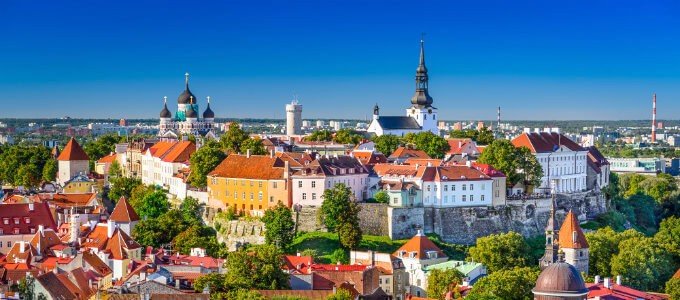Looking to spend up to a year living and working remotely from Europe? If you’re a remote worker or online business owner, Estonia’s Digital Nomad Visa (DNV) program can help you achieve just that. Let’s take a look at its requirements below…
Estonia’s Digital Nomad Visa: Your gateway to a year of European memories
Up until around the pandemic, long-stay visas and the ability to legally work from other countries posed tiresome challenges for remote workers around the world. Hence, the launch of the Estonian Digital Nomad Visa – a first in Europe – came as really welcome news.
The country’s DNV program paved the way to overcoming these challenges, whilst crucially also allowing qualifying nomads the ability to travel through the Schengen Area visa-free.
And since 2020, when the program was first launched, we’ve seen a proliferation of DNVs around the world – including many that are more attractive than that of Estonia…
(NOTE: The Estonian DNV is not a separate visa category. It’s basically just a set of conditions for which the EU’s D-Category settlement visa is issued.)
But before we look at the program’s benefits, let’s have a look at its downsides first…
So… What’s there NOT to like about the Estonian DNV?
THE WEATHER: Let’s start with the obvious: Estonia is not located in the Iberian Peninsula. Bordered by Latvia to the south and Finland to the north, it is chilly, to say the least.
Average summer temperatures peak at only 68° Fahrenheit (20° Celsius), whilst the average winter temperatures dip to around 17° Fahrenheit (-8° Celsius) or below, with months of gloomy skies and short daylight hours.
So if you’re a beach lover, you can safely give this option a miss.
INCOME REQUIREMENTS: With a recently increased minimum income requirement of €3,924 per month (pre-tax) per adult person, the program won’t be accessible for many younger nomads, in particular. (More on the program’s key requirements below…)
For comparison, Malta requires a monthly income of just €2,700+ and Portugal’s newly launched program – not to be confused with the D7 Visa – requires an income of €2,820+ per month.
Your Latin American options are even more affordable: Brazil requires you to earn just $1,500 per month, while Colombia wants to see a meager $665 in monthly earnings.
POTENTIAL TAX IMPLICATIONS: For the uninitiated, taxation in Estonia can be a complex issue to navigate. And if you were to spend more than 183 days per year there, you’ll most likely find yourself in the country’s tax net.
It’s therefore advisable to discuss your situation with a knowledgeable tax professional before moving there for six months or more. Sovereign Confidential members, feel free to reach out to us if you’d like a recommendation for one of our vetted service providers on the ground.
COST OF LIVING: While Estonia’s cost of living is relatively cheap by Europe standards, it’s still high compared to that of scores of other countries offering Digital Nomad Visas. So if geo-arbitrage is your objective – earning hard currency and living somewhere far cheaper – there are certainly better destinations to consider.
NO PATH TO PERMANENT RESIDENCY OR CITIZENSHIP: As is the case with most DNVs, the Estonian program does not lead to any permanent residency status. The visa can also only be renewed for an additional 6-month period, after which you’ll have to leave the country (and the EU).
What are the program benefits?
THRIVING TECH HUB: Purportedly, Estonia is home to more than 5.5X more startups, per capita, than the average European country. So if you’ll be building your own startup while staying in Estonia, you should also be able to network and forge valuable relationships with players in the country’s startup scene.
EU VISA-FREE TRAVEL: While you’ll be required to prove that you have a fixed address in Estonia in order to qualify for the program, you can use the country as a base from which to explore the other 26 EU countries.
(You are legally allowed to visit other EU countries for 90 out of each 180 days, however the borderless nature of the EU means that this limit is difficult to enforce.)
STREAMLINED APPLICATION PROCESS: While you will be required to schedule an appointment with your local Estonian consulate to have your visa issued, the application process can be started online.
LOW PROCESSING FEES: You can expect to pay a processing fee of around €100 for your visa processing. (If you have to work via a third party to book your consular appointment, an additional fee may be payable, too.)
What will you need to apply?
In order to qualify, you’ll have to meet the following requirements:
REMOTE WORKER STATUS: To qualify, you’ll need to be able to prove your digital nomad status.
INCOME REQUIREMENTS: If you’re applying as a single person, you’ll need to show that you are earning a stable income of at least €3,924 per month (calculated based on having $130.80 per day x 30 days – and ideally more). So let’s call that a round €4,000 to simplify things.
That’s pretty steep, by DNV standards.
But here’s the rub…
According to an official at the Embassy of Estonia in London with whom we spoke, to add a spouse (or dependent adult) to your application, you’ll need to prove earning an additional $3,924 per month.
So you’ll collectively have to earn at least €8,000 per month if you’re applying as a couple. And you’ll have to prove that you’ve been earning this for the past 6 months prior to applying…
They also mentioned that having sufficient savings to support yourself for several months can help improve your chances of being approved for the visa.
POLICE CLEARANCE: As with many other EU residency visas, you’ll need to obtain a police clearance certificate from your country of origin or present residence.
HEALTH INSURANCE: You will be required to have health insurance to cover your entire stay in Estonia.
PROOF OF ACCOMMODATION: You’ll be required to have a fixed address during your entire stay in Estonia.
The bottomline
While not everyone will be keen on spending long periods of time in a chilly Northern European country, Estonia can serve as a great base from which to explore the rest of Europe.
And while the program’s minimum income requirements are high, being based in Tallinn, the country’s capital, can provide an amazing cultural immersion experience and highly valuable networking opportunities.
And if you do end up pursuing this program, be sure to share your experiences with us.








